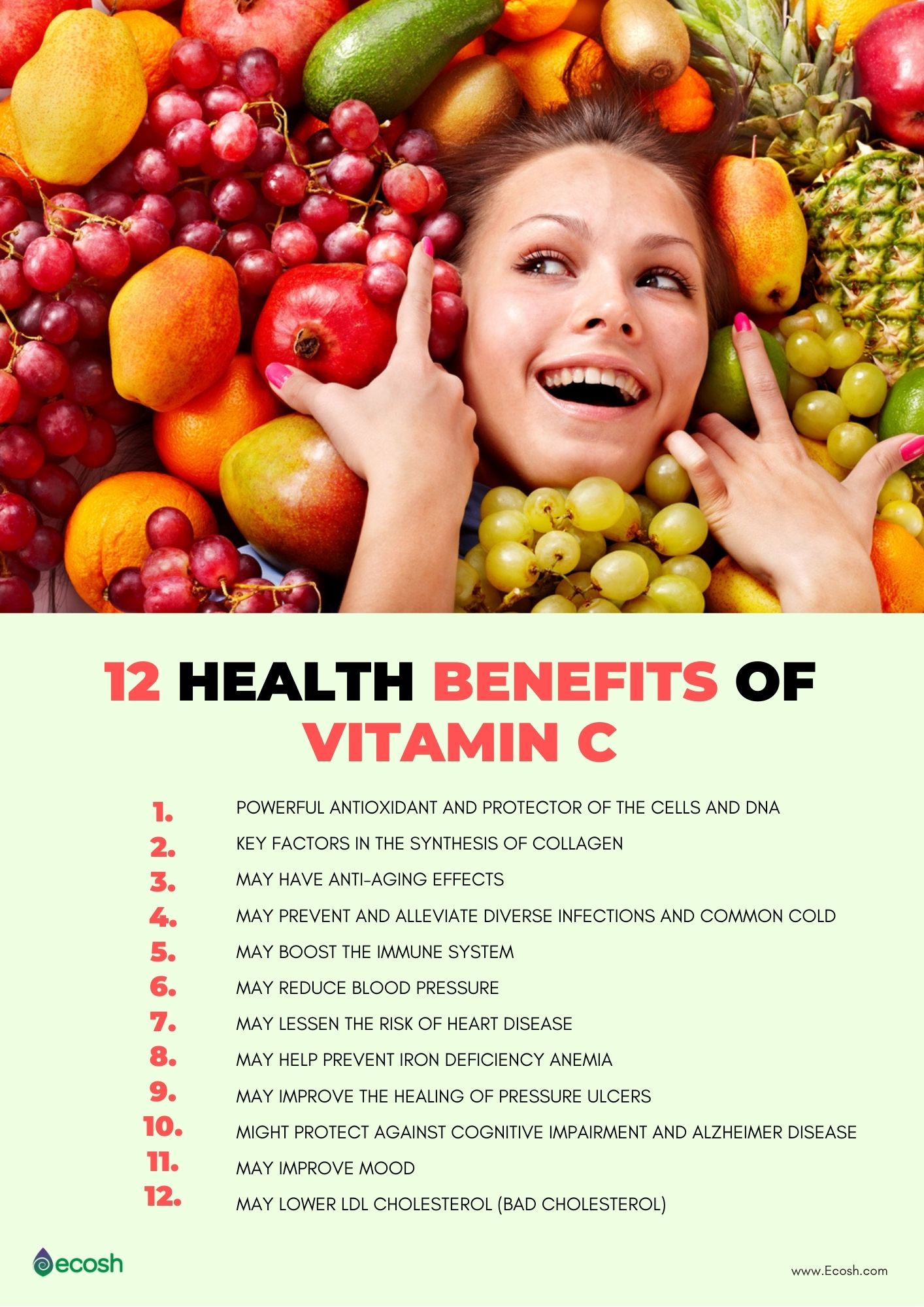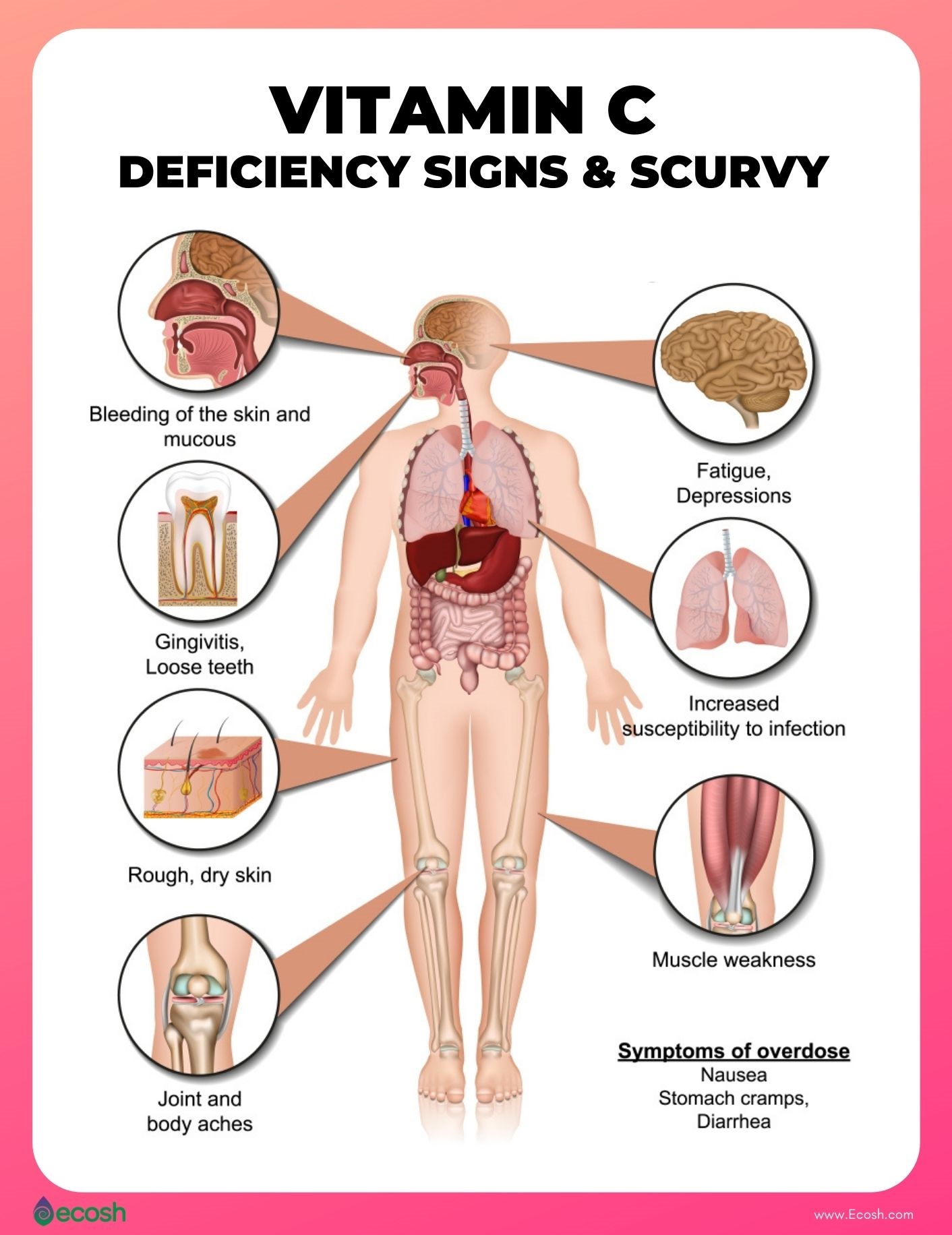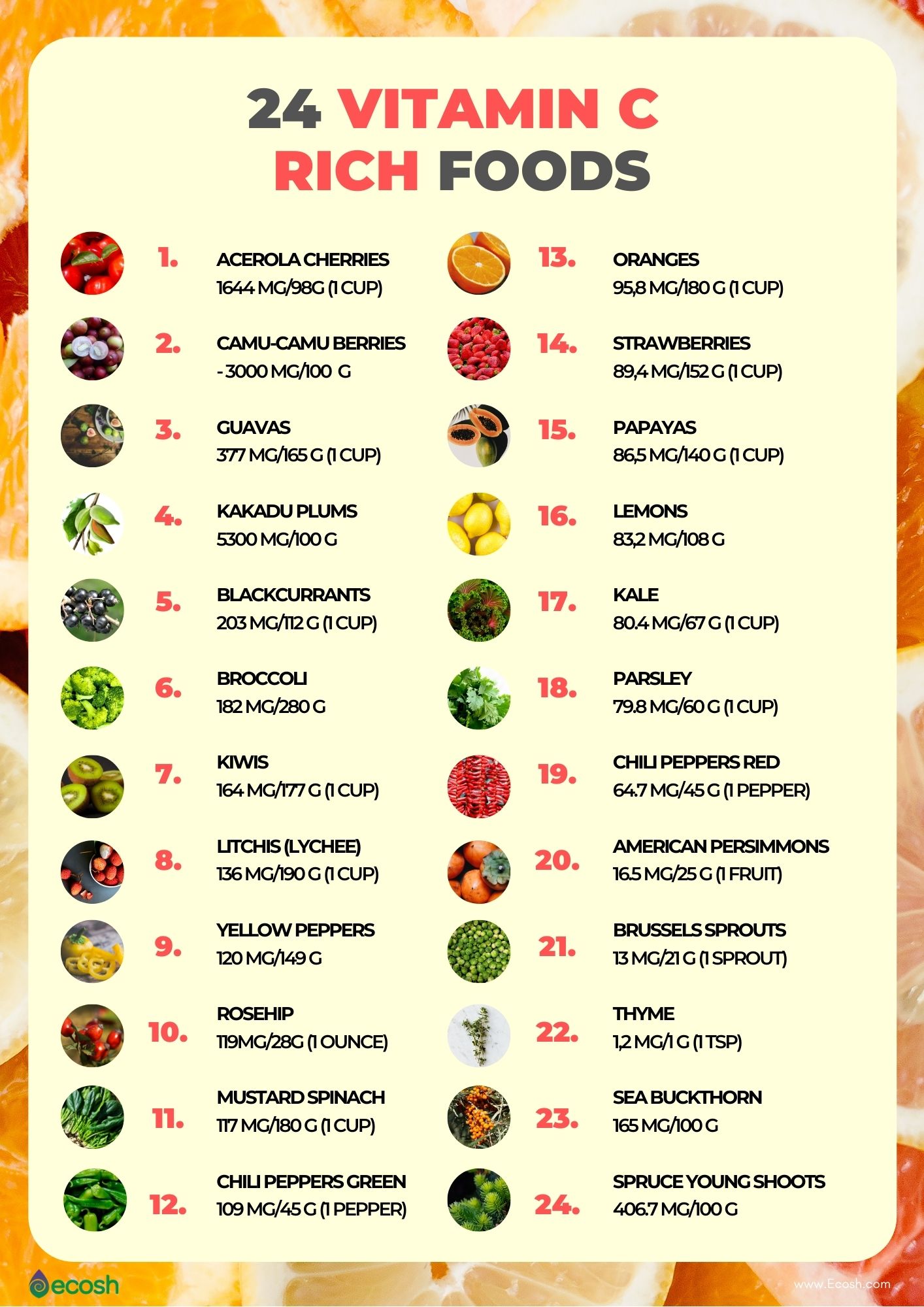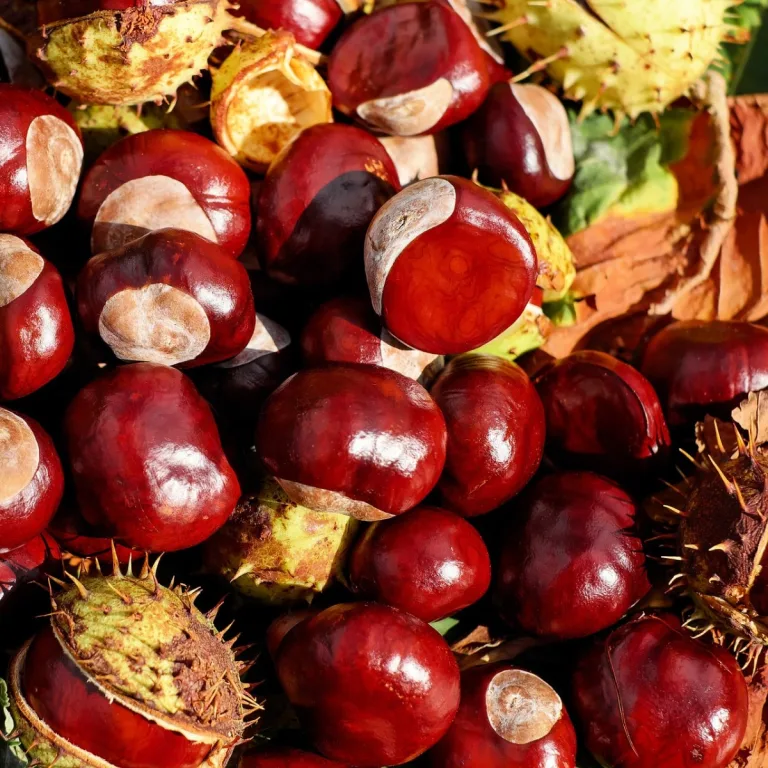Vitamin C (ascorbic acid) is undoubtedly a well-known water-soluble vitamin to all of us, but do we know how important this vitamin really is and what vital roles it plays in the body?
Therefore, let’s take a closer look at ascorbic acid 12 health benefits, deficiency (scurvy) causes, symptoms and risk groups, 24 vitamin C rich foods and suggested daily doses.

12 Health Benefits of Vitamin C
1. Powerful Antioxidant and Protector of The Cells and DNA
Vitamin C acts as a powerful antioxidant, as it is an electron donor. It fights free radicals and protects cells and DNA from the damage caused by oxidation (39, 40).
The TV show “Trust me I’m a Doctor” tested the antioxidant behavior in the blood when drinking antioxidant rich smoothies. The result showed that the level of antioxidants in the blood rose sharply within one hour, when the person consumed more antioxidants. However, after four hours, the opposite effect occurred, the amount of antioxidants in the blood had undergone a drastic fall and did not recover until within 24 h.
Therefore, even if the antioxidants we take in our diet do neutralize free radicals, drinking extra can’t be neutralizing more, because the body has a mechanism to deal with such an instant boost, and removes additional antioxidants in the blood quickly. The same occurred to the sugar from the smoothie – it caused a sudden boost, and then a sudden drop afterwards to below baseline.
In conclusion, it’s better to consume juices and smoothies in small quantities, because of the high levels of very readily accessible sugar they contain (41).
2. Vitamin C is Involved in The Formation of Collagen
Collagen is the crucial component of connective tissues that formulate various body parts, including muscles, tendons, ligaments, and skin. In addition, it helps maintain the elasticity and durability of the skin and blood vessels.
However, your body cannot produce collagen without an adequate amount of vitamin C, as it is unconditionally one of the key factors in the synthesis of collagen and photoprotection (42).

3. Vitamin C May Have Anti-Aging Effects
Even more, by increasing collagen synthesis, vitamin C may also possess anti-aging effects (42).
4. Vitamin C May Play a Role in Preventing and Alleviating Diverse Infections and Common Cold
From a wide series of animal studies researchers have concluded that this vitamin might participate in preventing, shortening, and alleviating diverse infections also in humans.
In addition, controlled studies have also demonstrated that vitamin C may relieve the common cold and impede colds under certain conditions. There is some evidence that this vitamin may also have effects on other infections, but there is a shortage of such data.
However, the practical importance and optimally efficient dosages of vitamin C for preventing and treating infections are unknown (43). Therefore do not start to self medicate and consult your doctor before taking any dietary supplements.
5. May Boost The Immune System
According to an article, vitamin C appears to be able to both prevent and treat respiratory and systemic infections by enhancing various immune cell functions. According to the same article, in case the need to prevent infection, vitamin C consumption should offer at least sufficient, if not overload plasma levels (for example, 100–200 mg/day), which enhance cell and tissue levels.
On the other hand, treatment of already set infections needs notably higher (gram) dosages to recompense for the raised metabolic require. The role of vitamin C in lymphocytes is less understandable, but it has been shown to improve differentiation and reproduction of B- and T-cells, probably because of its gene managing effects.
Therefore, the lack of this vitamin may result in impeded immunity and higher vulnerability to infections (44).
6. May Reduce Blood Pressure
According to a study, in short-term trials, vitamin C supplementation reduced systolic blood pressure and diastolic blood pressure. However, long-term trials are still needed (45).

7. May Lessen The Risk of Heart Disease
The results of a study suggest that high supplemental vitamin C intakes may reduce the incidence of major coronary heart disease events (46).
8. May Help Prevent Iron Deficiency Anemia
The results of one study indicated that vitamin C supplement alone could effectively control children’s iron deficiency anemia (IDA) (47).
9. May Improve The Healing of Pressure Ulcers (Pressure Sores)
According to studies, ascorbic acid may also accelerate the healing of pressure ulcers (pressure sores) (48, 49).
10. Vitamin C Might Protect Against Cognitive Impairment and Alzheimer Disease
Studies suggest that vitamin C might protect against cognitive impairment and delay cognitive decline in the elderly (50, 51). Use of vitamin E and vitamin C supplements in combination is also linked with lessened prevalence of Alzheimer disease (52). However, do not start to self medicate, as more human studies are still needed.
11. May Improve Mood
In addition, the findings of a study suggest that there might be a possible relationship between vitamin C status and improved mood state in young adult male students (53). Moreover, several other studies have also shown that the supplementation of this vitamin may produce antidepressant effects and improve mood (54).
12. May Lower LDL Cholesterol (Bad Cholesterol)
According to a study, taking at least 500 mg of vitamin C a day, for a least of 4 weeks, may result in a notable drop in serum LDL cholesterol (bad cholesterol) and triglyceride concentrations. However, it did not help to elevate the HDL cholesterol (good cholesterol) levels (55).

Risk Factors for Vitamin C Deficiency
Vitamin C deficiency is determined as a serum concentration smaller than 11.4 umol/L. The prevalence of vitamin C deficiency is different around the world. For example, the rates are 7.1% in the United States and 73.9% in north India. Human body can store about 1500 mg of this vitamin, and clinical characteristics of deficiency materialize after that level is decreased to less than 350 mg (35). Deficiency risk factors include:
- Alcoholism
- Babies only fed cow’s milk
- Seniors only consuming tea and toast diet
- Individuals with eating disorders
- Type 1 diabetes patients who have high vitamin C requirements
- People who suffer from disorders of the GI tract such as inflammatory bowel disease
- Individuals who have iron overload which causes wasting of vitamin C by the kidneys
- The vitamin C deficiency is also associated to stress-related diseases
- Smoking
- Individuals with restrictive diets
- Individuals with food allergies
- Patients on hemodialysis
- Individuals with overall poor nutritional status and who do not eat sufficient amount of fruits and vegetables
- Women who consume oral contraceptives (OCs) (35, 36, 38)
- In addition, medications that diminish Vitamin C (inhalant, systemic, and topical corticosteroids, and salicylates) (37):
- Beclomethasone
- Budesonide
- Dexamethasone
- Fluticasone
- Hydrocortisone
- Methylprednisolone
- Mometasone Furoate
- Prednisone
- Triamcinolone
- Aspirin (37)
Vitamin C Deficiency Signs and Scurvy
Vitamin C deficiency can lead to a disease called Scurvy, which is caused by a long-term deficiency of vitamin C. Symptoms of vitamin C deficiency may start to appear after 8 to 12 weeks (1, 2).
1. Early stages have often symptoms such as:
- Malaise
- Fatigue
- Lethargy (2)
2. One to three months of insufficient intake of vitamin C can lead to health conditions such as:
- Anemia
- Myalgia
- Bone pain
- Easy bruising
- Swelling
- Petechiae
- Easy bruising and perifollicular hemorrhages.
- Corkscrew hairs
- Gum disease
- Poor wound healing
- Mood changes
- Depression (2)
3. Late stages of scurvy are more serious and life threatening, general signs include:
- Generalized edema
- Severe jaundice
- Hemolysis
- Acute spontaneous bleeding
- Neuropathy
- Fever
- Convulsions
- Death (2, 3)
The Treatment for Scurvy is Vitamin C Administration
Recommendations are:
- 1000 – 2000 mg for the first 2 to 3 days
- 500 mg a day for the next 7 days
- 100 mg of vitamin C per day for 1 to 3 months
Some symptoms such as fatigue, lethargy, pain, anorexia, and confusion should improve within 24 hours of supplementation. Other symptoms like bruising, perifollicular hemorrhages, gingival bleeding, and weakness usually take 1 to 2 weeks to improve. However, complete recovery is generally anticipated after about 3 months of regular ascorbic acid supplementation (2, 4).
24 Vitamin C Rich Foods
Vitamin C Rich foods are for example:
- Acerola cherries: 1644 mg/98g (1 cup) – 2740% DV (7)
- Camu-camu berries raw; Camu powder: 2400 to 3000 mg/100 g; According to product nutrition labels, camu powder contains 682 mg/5 g (1 tsp) – 750% DV (26, 29)
- Guavas: 377 mg/165 g (1 cup) – 628% DV (10)
- Kakadu plums: 5300 mg/100 g and 481 mg/1 plum – 530% DV (5, 6)
- Currants, especially blackcurrants: 203 mg/112 g (1 cup) – 338% DV (12)
- Broccoli: 182 mg/280 g (1 large stalk) – 303% DV (18)
- Kiwis: 164 mg/177 g (1 cup) – 273% DV (17)
- Litchis (Lychee): 136 mg/190 g (1 cup) – 226% DV (21)
- Sweet yellow peppers: 120 mg/149 g (1 cup chopped) – 200% DV (11)
- Rosehip: 119mg/28g (1 ounce) – 199% DV (8)
- Mustard spinach: 117 mg/180 g (1 cup) – 195% DV(15)
- Chili peppers green: 109 mg/45 g (1 pepper) – 182% DV (27)
- Oranges: 95,8 mg/180 g (1 cup) – 160% DV (25)
- Strawberries: 89,4 mg/152 g (1 cup) – 149% DV (24)
- Papayas: 86,5 mg/140 g (1 cup) – 144% DV (23)
- Lemons: 83,2 mg/108 g (1 fruit without seeds) – 139% DV (20)
- Kale: 80.4 mg/67 g (1 cup) – 134 DV (16)
- Parsley: 79.8 mg/60 g (1 cup) – 133% DV (14)
- Chili peppers red: 64.7 mg/45 g (1 pepper) – 108% DV (9)
- American Persimmons: 16.5 mg/25 g (1 fruit) – 27% DV (22)
- Brussels sprouts: 13 mg/21 g (1 sprout) – 22% DV (19)
- Thyme: 1,2 mg/1 g (1 tsp) – 2% DV (13)
- Sea Buckthorn: 165 mg/100 g – (28, 30, 31)
- In addition, spruce young shoots (Sprouts) fresh: 406.7 mg/100 g DW (56)
%DV – Daily Value (31). Most Percent Daily Values (%DV) here in this list are according to the website NutritionData, for adults or children aged 4 or older, and are based on a 2,000 calorie reference diet. However, your daily values may be higher or lower based on your individual needs.
The Storing of Vitamin C Rich Foods
This vitamin is easily broken down by temperature, oxygen and light. Therefore, it’s important to know:
- For the winter, they could be stored in the freezer, as this would result in the lowest vitamin loss
- Do not soak or store veggies and fruits in water
- If you boil fruits or vegetables, use also the boiling liquid
- Store fresh fruit juices in the refrigerator, however do not keep fresh fruit juices in bulk in the refrigerator for more than 2-3 days.
- Also, consume fresh peeled fruits within 2-3 days
How Much Vitamin C to Take at Once?
The current RDAs for vitamin C (31, 34):
AI (Adequate Intake) for Infants
- 0–6 months: 40 mg (227 µmol)/day of vitamin C ≈6 mg/kg
- 7–12 months: 50 mg (256 µmol)/day of vitamin C ≈6 mg/kg
RDA (Recommended Daily Allowance) for Children
- 1–3 years: 15 mg (85 µmol)/a day
- 4–8 years: 25 mg (142 µmol)/a day
- Boys 9–13 years: 45 mg (256 µmol)/a day
- Boys 14–18 years: 75 mg (426 µmol)/a day
- Girls 9–13 years: 45 mg (256 µmol)/a day
- Girls 14–18 years: 65 mg (370 µmol)/a day
RDA (Recommended Daily Allowance) for Adults 19 – 50 Years
- Men 19–30 years: 90 mg (511 µmol)/a day
- Men 31–50 years: 90 mg (511 µmol)/a day
- Women 19–30 years: 75 mg (426 µmol)/a day
- Women 31–50 years: 75 mg (426 µmol)/a day
RDA (Recommended Daily Allowance) for Adults 51 – 70 and >70 Years
- Men 51–70 years: 90 mg (511 µmol)/a day
- Men >70 years: 90 mg (511 µmol)/a day
- Women 51–70 years: 75 mg (426 µmol)/a day
- Women >70 years: 75 mg (426 µmol)/a day
RDA (Recommended Daily Allowance) for Pregnancy
- 14–18 years: 80 mg (454 µmol)/a day
- 19–30 years: 85 mg (483 µmol)/a day
- 31–50 years: 85 mg (483 µmol)/a day
RDA (Recommended Daily Allowance) for Lactation
- 14–18 years: 115 mg (653 µmol)/a day
- 19–30 years: 120 mg (682 µmol)/a day
- 31–50 years: 120 mg (682 µmol)/a day (31, 34)
Smokers
- In addition, individuals who smoke require 35 mg/day more vitamin C than nonsmokers.
It is recommended that you take the amount of vitamin C over the day and do not take more than 1 capsule (500 mg) at a time as a dietary supplement. In addition, it is advisable to avoid taking it in the evening, as vitamin C has a stimulating effect and can prevent you from falling asleep.
However, those taking statins should consult a doctor, as large amounts of ascorbic acid may interfere with the action of blood thinners. The upper limit for vitamin C is 2,000 mg a day (33). In conclusion, for most people, a healthy diet should provide sufficient amounts of vitamin C.
What May Happen in Case of Overdose?
Although too much dietary ascorbic acid is unlikely harmful, huge amounts (more than 1,000mg per day) of ascorbic acid dietary supplements might cause health conditions such:
- Stomach pain
- Diarrhea
- Heartburn
- Flatulence
- Nausea
- Vomiting
- Abdominal cramps
- Headache
- In addition, insomnia
However, these symptoms should pass away once you stop taking the ascorbic acid dietary supplements (32, 33).
NB! The information provided here is for informational purposes only, so do not consider it as health care or medical diagnosis and treatment. Do not consider this information as a guarantee of the results you want to achieve. In addition, this information here is not intended to replace the advice of your physician or other healthcare professional.
Even more, you should not use it to diagnose or treat a health problem. Before changing or discontinuing your existing medication, treatment, or care, or taking any dietary supplements, be sure to consult with your healthcare professional or doctor before starting any diet or program, or if you suspect you may have a medical condition.
Compiled and edited by Maria-Helena Loik
Pictures: Pixabay.com, Pexels.com, Shutterstock.com






